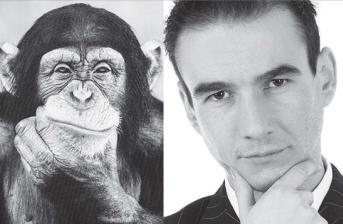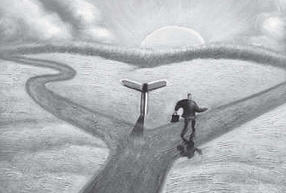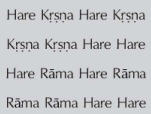Humans and animals is happiness the same for them?
How are Humans Special?
How are humans different from animals? One may imagine that an animal can’t think logically, can’t reason, question, or use intelligence. These are special gifts awarded to humans alone. However, on closer inspection it’s obvious that animals also use intelligence. For instance, have you seen a cat sneak into the kitchen when nobody is watching? She knows exactly when to enter and where the milk is kept. In the ashrama where I stay, we were each given a couple of hangers to hang our shirts after we washed them. We would leave our shirts hanging on the terrace of the ashrama. Gradually, all ashrama residents lost their hangers, and we wondered who had stolen them and when. As the weeks passed we forgot about the incident.Then one day as I was standing on the terrace, I saw something that shocked me. On the top branch of a tree next to the ashrama was a beautiful bird’s nest. I say “beautiful” because it was so unusual: it was made entirely of clothes hangers! I called the other inmates, and we all witnessed the amazing skill of these simple birds. Where did these birds learn to make a nest, leave alone an expert one made of hangers? We’ve never heard of birds studying civil engineering at the premier Indian Institute of Technology. No, animals have an inborn intelligence.The only difference between their intelligence and ours is that they can’t think or use their intelligence beyond what we call the ‘SEED’ purposes: the propensity to sleep, eat, enjoy, and defend.
The ‘ABCD’ Difference Between Humans and Animals
Humans have the same SEED propensities, but they stand out against animals due to their four specially endowed propensities, which I’ve named ‘ABCD.’
‘A’refers to the Ability to enquire into higher pleasure; B is the capacity to feel a Bliss that is superior to the happiness of satisfying the body; C is the ability to make Choices that bring us those higher pleasures; and D is the Determination to practise the above three.
Let’s briefly examine each of these four:
The ability to enquire about higher and nobler goals is the exclusive prerogative of humans. Animals can’t think beyond the basic needs of SEED. Humans, however, can pursue sublime goals and have been encouraged to do so by the wisdom books of every age and culture. Such enquiry sends uson a journey to higher realms of happiness; failure to enquire pulls us down to live only to satisfy our basic animal needs. A life not centred on more fulfilling and meaningful pursuits is beset with the same hardships and dullness that plague animal life.
The Four Levels of Human Happiness

Bliss is the second difference that sets humans apart from animals. There are higher levels of pleasure which humans can experience vis-á-vis the animals, due to their more developed consciousness. Essentially humans have four basic levels of happiness, and these are experienced by different people according to the different levels of their spiritual advancement. The lowest experience is called parthiva-rasa. This term refers to the highest possible pleasure one could experience if his or her physical faculties are fully developed. Parthiva-rasa, enjoyment of the flavors of the earth, is at its fullest when one’s senses are strong and one has unlimited resources to enjoy them. More elevated than this is svargiya-rasa, emotional flavors pleasures experienced not through the physical body but through relationships, especially relationships involving love. Even if one’s physical senses are not strong, svargiya-rasa gives a kick and keeps us mentally happy. A thousand units of parthiva pleasure can at best match one unit of svargiya happiness. Even those debilitated by serious physical illness, and thereby unable to enjoy bodily pleasures, can be happy if they experience the pleasure of society, friendship, and love.
However, if we multiply the taste one gets from svargiya-rasa by ten thousand, one approaches the happiness that can be derived from brahman-rasa,or the pleasure spiritualists who seek liberation experience when they attain it. These spiritual practitioners reject the material world and its pleasures and instead focus on the eternal truth within and without, Brahman.
Deep absorption in permanent reality gives a spiritual seeker a happiness that transcends in quality the pleasures offered by both the body and one’s society. However,even the highest attainment of Brahman happiness is insignificant a drop in the desert compared to the ocean of pleasure found in remembering and offering loving service to God. This last type of pleasure is called bhakti-rasa, the taste one derives from loving reciprocations with God. So when a human being practises loving devotional service to God, he or she experiences the culmination of all happiness. Therefore this grade of bliss, called as bhakti-rasa is there for all human beings to explore and exploit to the fullest capacity.
Happiness Through Choice or Instinct?

The third difference that sets humans apart from animals is the ability humans have to make proper choices and take responsibility for seeking higher pleasures. Animals can’t make choices; they act on instinct. When faced with a stimulus, animals respond instinctively; they have no freedom of choice. Humans, however, can pause, reflect, and then respond to a stimulus based on independent choice. The existence of free will is a special human endowment that gives them the power to choose their response. For example, if you slap a child on the back, the child may cry instantly; there is no gap between stimulus and response. However if you slap a grown up man on the back, he will pause before he responds to the stimulus. In the space between the stimulus and response, he may analyse if the slap was friendly, sarcastic or out of hatred. Depending on his perception of the reality he shall then exercise his choice. Thus humans can make a conscious choice to seek higher happiness; they don’t have to necessarily act out of basic animal instinct. They have the power to say ‘no’ to the pulling of the mind. And that power is tapped through the fourth endowment.
The fourth difference (‘D’ in ABCD) is Determination. Once having made a choice to seek spiritual pleasures, we need to exercise determination. Humans have tremendous potential to practise determination, even in the most trying circumstances of life. Animals, even if they exercise determination, it’s essentially for meeting the requirements of SEED. Humans on the other hand can pursue a determined effort to experience a higher, transcendental pleasure.

The similarities between humans and animals are ‘SEED’ (Sleeping, Eating, Enjoyment, and Defending). The differences can be remembered as ‘ABCD’ (Ability to enquire, Bliss, Choice, and Determination).
To be continued… Are humans more miserable than animals?
Vraja Vihari Dasa holds a master’s degree in International Finance and Management (MBA). He serves as a full-time resident devotee at ISKCON Mumbai and teaches Krsna consciousness to students at universities. He also conducts devotional seminars and training programmes for the temple’s congregation members.
